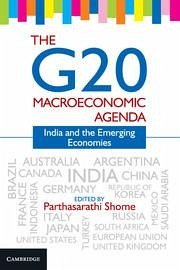
Central Banking and Monetary Policy in the G20
Paradigms and Challenges
Herausgeber: Kalayci, Irfan
Versandkostenfrei!
Versandfertig in über 4 Wochen
120,99 €
inkl. MwSt.

PAYBACK Punkte
60 °P sammeln!
Behind productive and prosperous economies are independent central banks that implement effective monetary policies. This observation is especially valid for the G20, which comprises the world's top twenty economies in terms of gross domestic product and the largest stakeholders of the global economic system. These economies include Argentina, Australia, Brazil, Canada, China, France, Germany, India, Indonesia, Italy, Japan, Mexico, Russia, Saudi Arabia, South Africa, South Korea, Turkey, the United Kingdom, the United States, and the European Union. Three features of this book, which focuses ...
Behind productive and prosperous economies are independent central banks that implement effective monetary policies. This observation is especially valid for the G20, which comprises the world's top twenty economies in terms of gross domestic product and the largest stakeholders of the global economic system. These economies include Argentina, Australia, Brazil, Canada, China, France, Germany, India, Indonesia, Italy, Japan, Mexico, Russia, Saudi Arabia, South Africa, South Korea, Turkey, the United Kingdom, the United States, and the European Union. Three features of this book, which focuses on central banking and monetary policy in the G20, an intergovernmental platform, stand out: Firstly, as contemporary theories and global practices confirm, the main purpose of central banks is to ensure monetary and price stability, not despite the government but in cooperation with it. This principle is strongly emphasized here. Governments, which must maintain fiscal discipline, are key to the success of central banks in combating inflation and deflation. Secondly, since the authors of the book chapters come from various countries and academic institutions, the book offers a range of perspectives and intellectual richness. Without deviating from the book's main axis, the authors examine the changing paradigms in central banking and the increasing challenges of monetary policy. This examination is based on developed and emerging economies, integrations, financial organizations, and economic crises within the G20, informed by significant sources. Thirdly, this book offers university researchers, professional business practitioners, and curious readers the opportunity to explore and reflect on new concepts such as green central banking, digital money, and interest-free monetary policies, which have gained prominence in the wake of the global COVID-19 pandemic, alongside mainstream topics. It is hoped that this book, consisting of 14 chapters, will inspire those who wish to conduct new and renewed academic studies on global central banks and monetary policies and will fill a gap in the literature.












